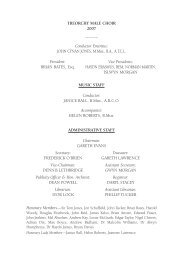EXCELSIOR - Treorchy Male Choir
EXCELSIOR - Treorchy Male Choir
EXCELSIOR - Treorchy Male Choir
Create successful ePaper yourself
Turn your PDF publications into a flip-book with our unique Google optimized e-Paper software.
<strong>EXCELSIOR</strong> 31<br />
Voice <strong>Choir</strong> Competition at the National Eisteddfod welcomed 20,000 fans,<br />
such was the popularity of choral contests. This exciting, vibrant and youthful<br />
industrial heartland of South Wales, of which the Rhondda was the most<br />
famous, became an entire hotbed of musical fanaticism. Competitors were<br />
vindictive: big money was at stake in bets, law suits took place and sabotage<br />
was used on more than one occasion. Long before village rugby teams<br />
reached a position of prominence, it was the choirs who inspired villagers to<br />
turn out en masse to watch the "battle of the giants". Newspaper reports of<br />
the period tell some joyous tales of adjudicators fleeing for their lives when<br />
awarded the first prizes at various eisteddfodau. Tomatoes, boots, even chairs<br />
were thrown across marquees at the adjudicator’s table. At one semi-national<br />
in Carmarthen, the adjudicator escaped from his hotel dressed as a policeman<br />
to avoid an angry mob.<br />
Rhondda Glee Society<br />
One of the 20th centuries most eminent Welsh composers, William Mathias,<br />
summed up the story of Rhondda choral music in Victorian times by saying,<br />
“The tradition of the 19th century Welsh choralism was as much a sociological<br />
as a musical phenomenon, arising out of the need of the people to<br />
express religious fervour or to rise above hardship and poverty through the<br />
means of choral singing. They are to be honoured for doing so. They and<br />
their leaders were in bond to their time in taking the only means open to



